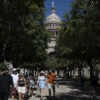The future stability of Venezuela and the survival of the “Bolivarian Revolution” increasingly focuses on the health of Venezuela’s indispensable but stricken autocrat. Before June, the scenario called for Hugo Chavez to rule in Venezuela until 2031. Suddenly, a post-Chavez era in Venezuela, which seemed unimaginable weeks before, moved immediately closer.
While the Chavez has not leveled entirely with his nation, the international press is now reporting the diagnosis: colon cancer. “President Hugo Chávez appears to be suffering from colon cancer.” “One source close to Chavez’s doctors told Reuters he has colon cancer and faces lengthy chemotherapy treatment.”
The future of Venezuela’s Bolivarian revolution now hinges on the nature of the malignancy, the progress of the treatment, the mustering of medical science, and the strength of the patient to combat an all-too-common killer. Noticeably, Cuban doctors (possibly Brazilian specialists) are studying his case, while Venezuela’s medical profession and Chavez’s domestic health system appear to be shoved aside.
The Daily Signal depends on the support of readers like you. Donate now
A prolonged medical watch has begun, but the genuine story to watch is the health of Venezuela rather than the struggles of a single individual, no matter how high he sits. While Chavez shrugs and declares he’s been “ambushed by life.” Millions of his countrymen on a daily basis realize that they’ve been ambushed by Chavez and his transitory revolution.
With their liberties, economy, infrastructure, and public security increasingly at risk, they may be less sympathetic with Chavez than is the international media, which wants to turn Venezuela’s tragedy into Chavez’s drama. Also to watch will be the struggle for succession if Chavez begins to weaken.
Chavez’s health will be monitored elsewhere, perhaps nowhere more closely than in Cuba.
From there writes Generation Y blogger Yoani Sanchez:
The degree of economic dependence binding Havana’s Revolution Square to the Miraflores Palace in Caracas suddenly seems more perishable than it did just a few weeks ago.… Over the past few weeks, panic has gripped fat-necked bureaucrats, officials who control the subsidies that come from Venezuela and entrepreneurs who resell a portion of the hundred thousand barrels of oil sent to us by what we like to call our “new Kremlin.”
Just don’t expect the U.S. State Department to say anything about the distortions and dangers one-man rule poses to a Latin American neighbor. For the State Department spokesman, Chavez’s illness is “is clearly a personal matter and something that he is dealing with—he and his family are dealing with.”
Personal matter or not, the future of Venezuela as a stable, democratic, prosperous, and law-abiding nation currently hangs in the balance. One ailing autocrat will not improve the situation.































